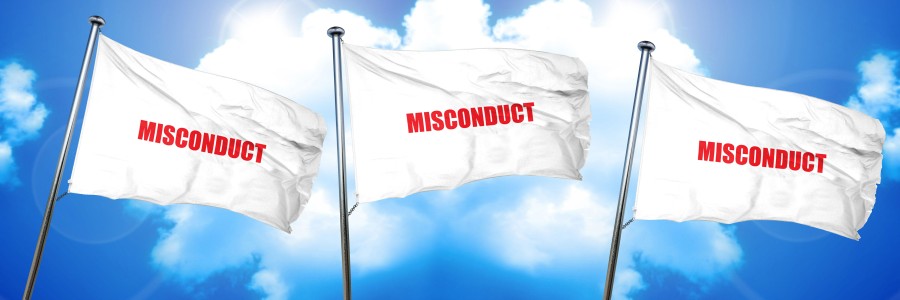
Gross Misconduct at Work
Gross Misconduct at Work: What It Is and Why It Matters
Gross misconduct! The phrase alone is enough to send a chill down any employer’s spine. But what exactly does it mean? Well, gross misconduct at work, in simple terms, refers to serious behaviour by an employee that breaches the fundamental terms of the employment contract.
When we talk about such misconduct, we are referring to actions that are so egregious that they undermine the trust and confidence necessary in an employment relationship. Indeed, these are actions that often warrant immediate dismissal, without notice or pay in lieu of notice.
Yet, as ominous as it sounds, it’s not all doom and gloom for employers. The better you understand gross misconduct, the more equipped you are to handle it appropriately when it surfaces. And remember, effective management of gross misconduct at work can protect your business in more ways than one.
Let’s consider some of the potential implications if gross misconduct is not managed properly:
- Legal consequences: If an employer dismisses an employee for gross misconduct without following a fair procedure, it could result in an unfair dismissal claim.
- Damaged reputation: Mishandling gross misconduct cases can also lead to negative publicity, potentially affecting customer relationships and future hiring efforts.
- Employee morale: Gross misconduct cases, if not addressed appropriately, can impact the overall morale and productivity of other employees.
What’s crucial for employers to remember is that not every act of misconduct reaches the ‘gross’ threshold. Being late for work, for instance, is a far cry from stealing company assets. Discerning between the two can often be challenging but is vital in ensuring fair and equitable treatment of employees.
So, gross misconduct is a significant concept that has the potential to fundamentally impact your business. As we look deeper into the topic, you’ll find a wealth of advice on how to recognise and handle these situations.
Recognising the Examples of Gross Misconduct at Work
Distinguishing between standard misconduct and gross misconduct can sometimes feel like walking a tightrope. It’s can be a fine line and is one we must tread carefully as employers. Misconduct can range from minor issues, like persistent tardiness, to major offences that can shake the very foundations of your workplace. The latter is what we’re focusing on today – gross misconduct.
When we talk about gross misconduct at work, we’re referring to behaviour that is so severe it justifies instant dismissal. To get a better grasp, let’s consider some examples:
- Theft, fraud, or dishonesty: These actions break trust, which is a vital component of an employer-employee relationship.
- Physical violence or bullying: Such behaviour can create a hostile work environment, not to mention the potential for harm.
- Serious health and safety violations: These could put everyone in your workplace at risk.
- Harassment or discrimination: These actions can lead to a toxic work culture, and they’re illegal.
- Serious insubordination: This undermines your authority and can disrupt workplace harmony.
However, keep in mind, context is important. The circumstances surrounding an incident can tip the scale between misconduct and gross misconduct. For instance, a heated argument between employees could be a simple case of misconduct. But if that argument escalates to physical violence, you’re venturing into gross misconduct territory.
The key takeaway here is the importance of fair judgement.
It’s crucial to evaluate the situation, gather all relevant facts, and avoid rushing to conclusions. Hasty decisions could lead to unjust outcomes, possibly inviting legal ramifications.
While these examples give you a solid starting point, it’s worth noting that gross misconduct can vary depending on the nature of your business and your specific workplace rules. Therefore, it’s highly recommended to set clear guidelines defining what constitutes gross misconduct in your company’s context.
Handling gross misconduct requires a careful, balanced approach – being firm but fair, decisive yet considerate. Over the coming sections, we’ll look into establishing a gross misconduct policy and the disciplinary process to navigate such situations.
Remember, prevention is always better than cure. Understanding what amounts to gross misconduct at work in the first place is a big step towards maintaining a safe, productive and harmonious workplace.
The Importance of a Clear Gross Misconduct Policy
Having an understanding of gross misconduct is vital, but putting that understanding into practice? That’s where the real challenge lies. Here’s where a well-drafted gross misconduct policy comes into play, acting as your beacon through the fog of workplace complications.
You need a specific gross misconduct policy as it establishes clear boundaries for acceptable behaviour and provides a framework for managing those instances where employees cross the line.
So, what should your gross misconduct policy include?
- Detailed definitions: Be clear about what constitutes gross misconduct in your company. Use specific examples where possible, but ensure there’s room to accommodate unforeseen scenarios.
- Procedures for handling cases: Outline the steps that will be taken if an allegation of gross misconduct is made. From investigation to disciplinary hearing and potential dismissal, make sure it’s clear.
- Potential consequences: It’s important to set out the potential outcomes of a gross misconduct case, including the possibility of summary dismissal.
Creating a robust policy isn’t just about ticking boxes and meeting legal obligations. It’s about fostering a culture of transparency and respect, where everyone knows where they stand.
The best policy in the world won’t make a difference if your employees don’t know about it. So, make sure it’s easily accessible. Include it in your employee handbook, display it prominently on your company intranet, discuss it in induction sessions and team meetings. Awareness is just as crucial as the policy itself.
Implementing a clear gross misconduct policy sets a strong foundation for your business. It promotes a fair and respectful work environment while providing a roadmap to handle those unfortunate instances of severe wrongdoing.
Navigating the Disciplinary Process for Gross Misconduct at Work
Every gross misconduct case needs a careful, decisive hand at its helm. Navigating the disciplinary process can feel daunting, but with the right approach, you can handle it efficiently and fairly.
When an allegation of gross misconduct surfaces, it’s important to act promptly. But remember, prompt doesn’t mean hasty. The first crucial step is a thorough investigation.
-
Conduct an investigation:
This is your fact-finding mission. Speak to all parties involved, gather evidence, and aim to get a clear picture of the incident. Ensure you document everything meticulously.
Upon completion of your investigation, if there’s a case to answer, it’s time to move onto the disciplinary hearing.
-
Convene a disciplinary hearing:
This is where the employee gets to present their side of the story. It’s essential to provide them with all the details of the allegations and evidence against them in advance. They also have the right to be accompanied by a work colleague or trade union representative.
Now, based on your hearing, if you find that gross misconduct has occurred, you may consider dismissal. However, it’s vital to think this through carefully.
-
Consider dismissal:
Dismissal for gross misconduct is a serious matter, often referred to as ‘summary dismissal’. It means the employee’s contract ends immediately, with no notice period or pay in lieu of notice. But before deciding, take into account the employee’s work history, the severity of their actions and any mitigating circumstances.
After making your decision, it’s crucial to provide the employee with a chance to appeal.
-
Allow an appeal:
Every employee has the right to appeal against a disciplinary decision. This allows for a fresh review of the case, often by a manager not previously involved.
This process may seem like a lot to handle, but it’s vital to ensure fairness and protect your business from potential legal issues. Remember, it’s not just about dealing with the issue at hand; it’s also about setting an example for your team and demonstrating your commitment to a respectful workplace.
Mitigating Risks: Preventive Measures and Training
Prevention is far better than cure. While having effective measures to handle gross misconduct is vital, setting a course that helps prevent such behaviour in the first place is the real key. So, let’s talk about preventative measures and the essential role of training in governing workplace behaviour.
Starting on the prevention side, here are a few strategies:
- Establish clear rules: Be clear about what constitutes gross misconduct and the consequences of such behaviour. Your gross misconduct policy should be comprehensive and easy for all employees to understand.
- Promote a positive workplace culture: Encourage a culture of respect, inclusivity, and open communication. A positive environment can significantly reduce the chances of gross misconduct incidents.
- Provide regular feedback: Regularly communicate with your employees about their performance and behaviour. Constructive feedback can nip potential issues in the bud before they escalate.
Now, onto training. I can’t stress enough how pivotal a role training plays in mitigating the risk of gross misconduct. Training not only reinforces acceptable behaviour but also empowers your team to spot and report potential issues.
Here’s what your training initiatives might include:
- Legal obligations: Make sure your employees understand the legal aspects related to gross misconduct. This includes laws on discrimination, harassment, data protection, health and safety and more.
- Company rules and policies: Ensure all team members are well-versed in your company’s policies. Regular refresher sessions can be invaluable here.
- Reporting and grievance procedures: Employees should know how to report potential gross misconduct incidents and what to expect once they do.
Prevention and training aren’t just about reducing incidents of gross misconduct, they’re also about building a workplace where everyone feels safe, respected, and valued.
Conclusion: The Balance Between Firmness and Fairness
As we conclude there’s one crucial point I want to underscore – the balance between firmness and fairness. Handling gross misconduct requires a steady hand that’s both firm in enforcing rules and fair in considering the circumstances.
Firmness is about setting boundaries and sticking to them. It’s about maintaining a clear stance against gross misconduct and ensuring that your employees understand the consequences of crossing the line. But being firm doesn’t mean being unyielding. Every case is different and deserves careful, individual consideration.
On the other side of the coin is fairness. Fairness is about ensuring a balanced, equitable approach in dealing with incidents of gross misconduct. It’s about giving your employees a voice and treating them with respect, even when they’ve potentially done wrong.
Conclusion:
- Understand gross misconduct: It’s crucial to know what gross misconduct is and the implications it can have on your business.
- Have clear policies: Having a clear policy on gross misconduct is essential in setting standards for behaviour in your workplace.
- Follow a fair process: Navigating the disciplinary process can be complex, but it’s vital for ensuring fair treatment.
- Prioritise prevention and training: Effective preventative measures and training are instrumental in reducing the incidence of gross misconduct.
As an experienced employment law specialist, I’m here to help and advise you.
Call John Bloor at EBS Law on 01625 87 4400 if you are an employer and need free Employment Law Advice.

